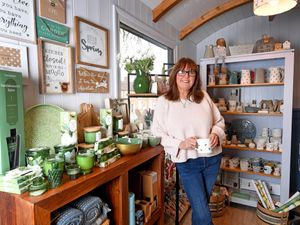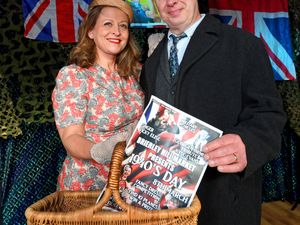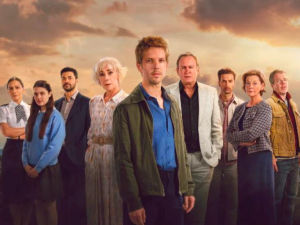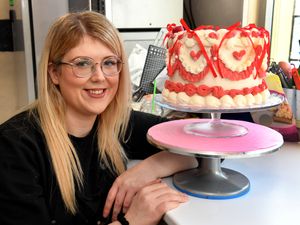First responders ready to jump into action
They are often first on the scene in an medical emergency ready to provide potentially life-saving first aid.
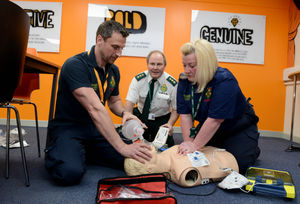
But community first responders are also a friendly face helping to reassure a patient until an ambulance crew arrives.
FastAid Black Country is a charity providing 28 trained volunteers community first responders who are called out by West Midlands Ambulance Service if they can reach a life-threatening situation quicker than an ambulance crew.
Community First Responders normally cover an area approximately seven minutes travelling time from their home or work place, often responding to cardiac arrests, heart attacks, strokes and choking as well as diabetic and other traumatic emergencies.
Carol Waite, aged 51, has been a first responder with FastAid for eight years and often attends call-outs with her husband and fellow responder Ian, 53.
By day Carol, who lives in Aldridge, works at a school as an assistant head of year 10 where her first aid training also comes in handy when her pupils get into scrapes or are taken ill.
She described her voluntary role with FastAid as ‘incredibly rewarding’ and said she enjoyed being able to make difference in people’s lives.
“I’m very much a people person and I wanted to give something back to the community.
“I’ve always wanted to do something along these lines but I thought I was probably too old to be a paramedic now – but being a responder is something I can do.
“You get to see all walks of life and it takes you places you never thought you might go.
“It can be hard at times because you don’t really know what you’re walking into – although we are always backed up by an ambulance crew so it’s a case of doing what you can do for the patient before they get there.
“It’s always the elderly ones that get me. A lot of the time these aren’t emergencies and it’s just a case of making them comfortable and sitting with them until the ambulance arrives.
“As soon as the door opens and they see the crest on our uniforms, you can see them visibly relax, their shoulders go down and I think we are a comfort to them,” she adds.
Calls can range from cardiac arrests to broken bones but anything involving young children always touches their hearts even if they aren’t the patients, says Carol, who is also a trustee of FastAid Black Country.
“I went to one house where a little girl had dragged a chair so she could reach to open the door because her dad needed help.
“He had cut his foot and there was blood everywhere. The poor little mite was so upset.
“But I’ve also been to ridiculous jobs where ambulance time has been wasted. One man had mouth ulcers and he called an ambulance. It’s hard to see ambulance time wasted because there could be people who really need that help,”she explains.
Graphic designer Paul Grove has been part of the team for four and a half years and is fulfilling a teenage ambition. “When I was 16 or 17 I wanted to be a paramedic but I needed to have a driving licence.
“I come from a working class background so I couldn’t afford to learn to drive let alone a car. So I ended up being a graphic designer which is something I love.
“As part of my job at Dudley Council we were filming a video for a campaign about the dangers of mixing alcohol and drugs. A paramedic helped us to set up the shot and he told me about community responders.
“For me it’s a great halfway house because I can do it alongside my full-time job. It’s giving something back to the community and helping to make a difference. If we go out to someone in cardiac arrest and we’re successful, then there is no greater feeling than that,” explains Paul.
“It’s not just about blood and guts and drama. It can be very every day things. I went out to a 103-year-old who was unwell and because it wasn’t a time-conscious emergency, we sat and had a cup of tea and a chat. I’ve never met anyone that age so it was really interesting,” adds the 43-year-old from Stourbridge, who is also vice-chairman of the group.
Another vital part of their role is education. They will go out into the community to teach people how to use life-saving defibrillators and about the appropriate circumstances in which to call 999.
Fundraising is also important to cover the cost of uniforms, equipment and vehicles with consumable items of kit and regular training provided by West Midlands Ambulance Service.
Andy Jeynes, the ambulance’s community response manager, says: “The community responders in the West Midlands are the best trained in the country. We value everything they do. There is a lot of commitment needed from anyone who becomes a responder but it’s also a very rewarding job too.”
FastAid Black Country is also being supported by intu Merry Hill which has provided a training room for the group to use and has also pledged other support such as hosting fundraising events.
Dan Murphy, general manager of intu Merry Hill, says: “We think it’s a brilliant community initiative and we were very happy to support FastAid Black Country in any way we can.
“It’s part of our commitment to helping the community.”
*FastAid, which also has a friends group helping to raise funds, will be soon begin recruiting new volunteers and potential community first responders.
Friends of FastAid is a non clinical role to help raise the profile of the charity and be involved in much-needed fundraising.
More information is available from www.fastaidblackcountry.org.uk

